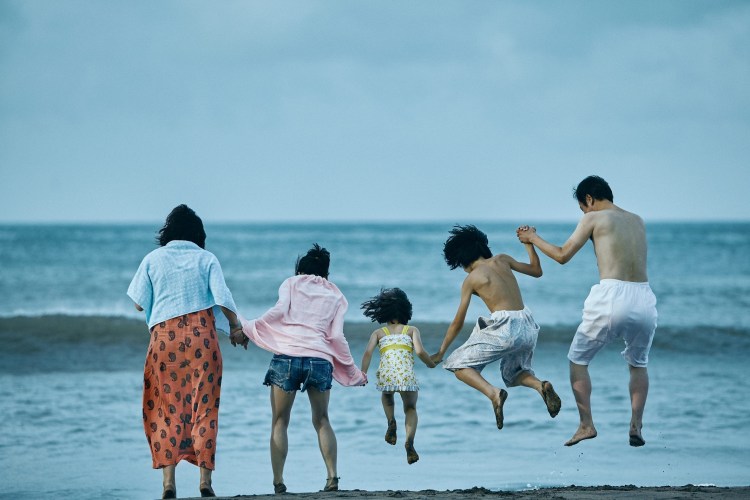Beneath the glitter and glamour, the sparkle and sass of 2019 Tokyo, there is, like in all great cities, an underground, a caravan of tiny rooms full of pilgrims looking for love and the warm touch of other humans.
In the dictionary, family, in the informal, is defined as “a group of people united in criminal activity.” And so begins the story.
In this year’s “Shoplifters,” writer-director Hirokazu Koreeda peels back the tourist gloss of Asia’s largest, most prosperous metropolis and gives us six members of such a family, many of them broken in body and spirit, clinging to one another for warmth, and engaging in shoplifting. None are joined in blood, only in pursuit of survival.
In the opening sequence, the “father” of this “family,” Osamu (Lily Franky), drifts through a shop with the teenaged Shibata (Jyo Kairi) and plays out what is obviously their daily game of thievery. Before each move, they both perform a silent ritual, a twining of fingers and a kiss to the back of the hand. Even thieves, it seems, have ceremony.
Osamu engages the shop owners with patter, while Shota carefully and professionally fills his student backpack with small packages of food and household items.
On the way home they behave more like teenage friends, sharing the excitement of their plunder. It’s not clear what their relationship is, father and son? Uncle and nephew?
It’s not until later in the film when we get all the answers almost at once and meet all the players and learn their dark, heart-breaking secrets and learn that, even without common blood, family has many meanings.
At home, a cluttered and shabby arrangement of bedding, kitchen and dining spots, we meet each of them:
Grandma (Kirin Kiki) is always here to greet the returning thieves, chattering in advice, remonstrations and occasional hugs.
Grandma has clearly over the decades created her own devices of survival and how to play the game.
There is a wonderful scene where a “house flipper” and erstwhile social worker come to check the set-up. He believes that Grandma is the sole occupant, which forces the old lady to shuttle the young ones out the back door to a prearranged hiding place, while the visitor is there.
One by one, the players appear on this stage while we watch the shadowy moves of each, acting like joyful members of a real family, motley but happy survivors of a global catastrophe, which director Koreeda makes perfectly clear is simply the stomping and suffocating 21st century.
There is Nobuyo, Osama’s mate (an amazing Sakura Ando, a brilliant actor, who steals every scene she’s in, with a smoky and warm sensuality).
In the middle of the film, another player is added. On a cold snowy night, Nobuyo and Osama on their way home find a small child (Miyu Sasaki) on the patio of her house, where they have seen her sitting before.
Inside, her upperclass parents are squabbling, and the mother screams, “ I didn’t even want to have her.” Touched by this, Nobuyo and Osama take her home with them.
“Isn’t this kidnapping?” Nobuyo asks.
“It’s only kidnapping if you ask for ransom,” Osama replies as they sneak away.
That night, the tiny, captivating Miyu will steal your heart and become a part of the group and a major player in the story.
“Shoplifters,” now on screen at Waterville’s Railroad Square Cinema, takes two full hours to play out, and clearly Koreeda stumbles along the way by falling too much in love with favorite moments. But each moment is golden, and much of that light falls on Ryuto Kondo’s photography.
“Shoplifters,” the 2018 Cannes Film Festival Palme d’Or winner and Japan’s submission for “Best Foreign Language Film” in this year’s Oscar race is, for this reviewer, a gift box full of startling direction, photography and acting.
Koreeda carefully and brilliantly polishes each role, each scene and moment to a high sheen, especially in the last half hour when everyone’s secrets are laid bare.
It is in these final moments that Sakura Ando, Osama’s mate, sitting alone in a green room, faces the camera and slowly comes unwrapped. There is nothing that can prepare you for this scene. Nothing.
J.P. Devine, of Waterville, is a former stage and film actor.
Send questions/comments to the editors.



